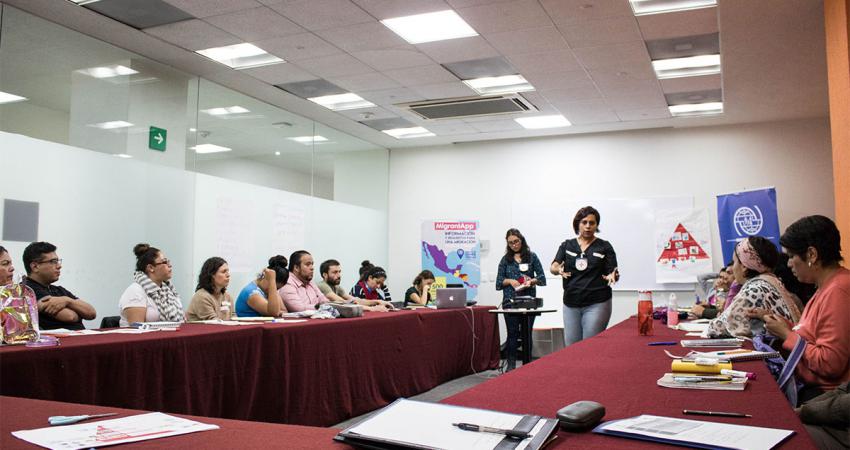IOM, ICRC and MSF in Mexico City organize the first workshop on psychosocial support in the context of migration


Mexico City - The United Nations Organization for Migration (IOM), in collaboration with the International Committee of the Red Cross (ICRC) and Doctors Without Borders (MSF) held a Workshop on Psychosocial Support in the Context of Migration, directed towards public officials, civil society organizations, and shelters staff, in Mexico City, from June 13-14, 2018.
IOM promotes psychosocial and mental health support to safeguard the human dignity and wellbeing of migrants, as an integral part of the organization's work. Since 2005, through its Regional Mesoamerica Program, IOM Mexico has sought to strengthen the psychosocial assistance skills of personnel who provide direct assistance to migrants. Therefore, it has carried out a thorough consultation process with government officials, civil society organizations, shelters, non-governmental organizations, and religious organizations, with the goal of identifying the principal challenges, best practices, and needs for assistance of migrants.
Based on the results of the consultations, IOM developed a Guide to Psychosocial Assistance for Migrants in Mesoamerica. The guide offers practical tools for strengthening psychosocial assistance skills and intervening in issues affected during migration, as well as implementing initiatives for self-care and care for the teams who provide assistance to migrants.
After replicating the workshop on psychosocial assistance for migrants in the states of Chiapas, Tabasco, and Oaxaca, IOM Mexico carried it to the national level in Mexico City, offering a space for dialogue and inter-institutional training on handling mental health in a migration context. The Pan-American Health Organization-World Health Organization (PAHO-WHO) assisted by participating in the presentation on international and regional progress on the health of migrant populations.
Mélida Suárez, the Coordinator of Humanitarian Aid for VENEMEX, an organization that assists Venezuelans who wish to immigrate to Mexico, commented, “These are workshops that really give us tools to be able to assist, at least in our case (VENEMEX), all the Venezuelans who are arriving in vulnerable situations with all the problems involved in leaving due to fear of danger, lack of medicine, or lack of food in your country and coming to another country that obviously you don't know. One of the things I'm taking away is that you don't have to be a psychologist to give psychological first aid."
The workshop was put on by IOM Mexico through the Mesoamerica Program, financed by the Bureau of Population, Refugees, and Migration of the Department of State of the United States of America, in collaboration with the ICRC and MSF.
The participants were the Mexican Commission for Aid to Refugees, Casa Refugiados, Jesuit Refugee Service, Casa Tochán, the Federal District Human Rights Commission, the National Institute of Migration, Childfund Mexico, the Secretariat of Foreign Affairs, Scalabrinianas Mission for Migrants and Refugees, the National Human Rights Commission, the Office of the Federal Attorney for the Protection of Children and Adolescents, Doctors Without Borders, Sin Fronteras IAP, the Counsel for Preventing and Eliminating Discrimination in Mexico City, Agenda Migrante, Otros Dreams en Acción, VENEMEX, the Mexican Youth Institute, the Rey Humanitarian Foundation, PAHO-WHO, SOS Children's Villages, Casa de los Amigos, and the United Nations High Commissioner for Refugees.
You can download the Guide to Psychosocial Assistance for Migrants in Mesoamerica (Spanish only), a practical guide which contains specific tools for psychological and psychosocial assistance for migrants in the different stages of the migration process. It also includes specific care and assistance activities for migrants and self-care for those who serve this population. An important feature of this manual is the possibility of replicating these activities in different contexts according to the complex profile of migrant persons in the Mesoamerican region. You can also register for our virtual course "Psychosocial Care for Migrants".
